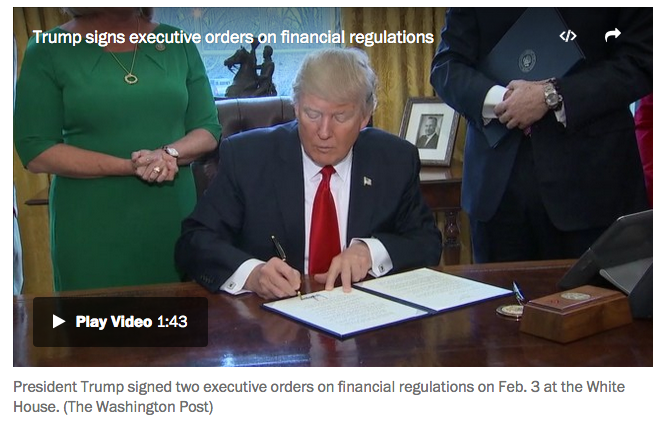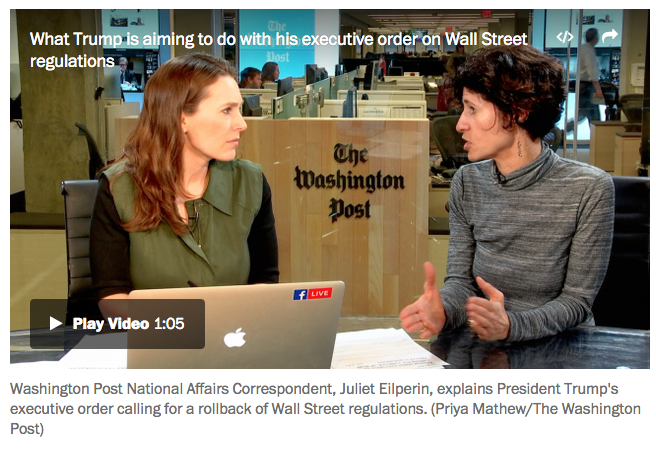President Trump on Friday launched a broad effort to ease regulations on Wall Street, setting up what is likely to be a protracted battle over how to unwind rules put in place after the last financial crisis. CLICK IMAGE for video:
In an executive order, Trump ordered a review of the laws and regulations that govern the U.S. financial system in an opening bid to upend 2010’s financial overhaul law, known as Dodd-Frank. The complicated legislation, which took months to negotiate, touches nearly every aspect of the way banks operate and includes hundreds of rules, some of which have yet to be implemented.
“We expect to be cutting a lot out of Dodd-Frank,” Trump said during a meeting with business leaders Friday morning. “Because frankly, I have so many people, friends of mine, that had nice businesses, they just can’t borrow money . . . because the banks just won’t let them borrow because of the rules and regulations in Dodd- Frank.”
The prospect of another drawn-out battle over a Wall Street overhaul is being met tepidly by some financial executives, who are wary of reawakening populist passions. After being the target of so many attacks in the years after the financial crisis, many have begun to see their profits grow and stock prices surge again, and they have urged the administration to proceed cautiously. Adjusting to a new regulatory environment would be too costly, they say.
Trump has so far been vague about what he would do to the complex law: The language of his executive order did not even include the phrase “Dodd-Frank.” Instead, he instructed the treasury secretary to report back in 120 days on what rules promote or inhibit the administration’s priorities. 
Dodd-Frank has had a profound effect on the financial industry, forcing banks to submit to yearly “stress tests” to prove they could withstand economic turbulence and draw up “living wills” that lay out how the banks could be dismantled without harming the rest of the financial system. One controversial component, called the Volcker rule, bars banks from trading in high-risk securities using their own capital, a practice that contributed to the last crisis. The rule also limited the ability of banks to hide exotic risky securities off the banks’ balance sheets, concealing the extent of the banks’ debts.
With Dodd-Frank still not fully implemented, critics have argued that Wall Street requires more oversight, not less. But Trump, who often attacked Wall Street during the campaign (and whose chief strategist, Stephen K. Bannon, has ripped into the big banks in the past), has adopted a different tone since taking office, offering to help the financial industry as part of a deregulatory agenda to boost the economy.
During the meeting with more than a dozen chief executives, Trump noted that there were several bankers in the room, including Larry Fink, chief executive of the huge investment firm BlackRock. “Larry’s got a lot of my money, and I have to tell you, he got me great returns,” Trump said to laughs in the room.
Later he noted that Jamie Dimon, the chief executive of JPMorgan Chase, one of the largest banks in the world, was also there. “There is nobody better to tell me about Dodd-Frank than Jamie,” Trump said, motioning to Dimon across the table.
Trump is not just consulting with Wall Street. He has tapped about six alumni of Goldman Sachs for key positions in his administration, including Gary Cohn, the bank’s former president and the current head of the powerful National Economic Council. Steve Mnuchin, who is awaiting confirmation as treasury secretary, spent 17 years at Goldman.
To unwind Dodd-Frank, some changes could be accomplished through appointing new leadership for the financial regulatory agencies, including the Securities and Exchange Commission and the Office of the Comptroller of the Currency. They could soften the impact of regulations through the rulemaking process or simply slow implementation.
On Friday, for instance, Trump also signed a memorandum that could delay a Labor Department rule that would require financial professionals advising on retirement rules to put their clients’ interests ahead of their own. The “fiduciary rule,” scheduled to go into effect in April, has long been a target of Republicans, including close Trump ally Anthony Scaramucci, founder of SkyBridge Capital. Critics say the legislation is burdensome and would prompt financial advisers to offer only the most ordinary advice to clients for fear they could run afoul of the rules.
To make more significant changes, Trump will need the cooperation of Congress. Rep. Jeb Hensarling (R-Tex.), chair of the House Financial Services Committee, is preparing to unveil legislation that would revise Dodd Frank. The executive order marks “the beginning of the end of the Dodd-Frank mistake,” Hensarling said.
One of the authors of Dodd-Frank, former representative Barney Frank (D-Mass.), was critical of new attacks on the law, taking note of how Trump is relying on people such as former Goldman Sachs leader Cohn, who come from the industry they would deregulate.
“This is a betrayal of his pledge to help the ordinary citizen against the big guys, against Wall Street. He is giving Wall Street what it couldn’t get through the political process,” Frank said.
Big banks, which have spent millions complying with the law, have called for a tweaking of the rules, rather than a complete overhaul. But smaller banks are expected to push for more aggressive changes. They say they are too small to pose a threat to the financial system but still face extreme regulatory burdens.
“The current one-size-fits-all style of regulation does not work for Main Street — local credit unions, small banks, and the consumers and small businesses they serve,” said Jim Nussle, president of the Credit Union National Association. “We’re hopeful that the core principles spelled out today will help ensure community financial institutions and the millions of Americans that rely on them are able to operate in a more favorable environment.”
The industry has been uniformly critical of the Volcker rule. Critics have said the rule, aimed at investments banks such as Goldman Sachs and Morgan Stanley, unnecessarily limits some safe activities. The industry also has complained about rules intended to change the way Wall Street executives are paid, making it harder for them to earn big bonuses by waging risky financial bets.
The administration’s efforts could also hit the Consumer Financial Protection Bureau, which was created by Dodd-Frank. Republicans have been pushing for an overhaul of the way the agency is run, including calling for its director, Richard Cordray, to be fired. But Democrats say the independent agency has played an important role in cracking down on big banks and corporations accused of misleading consumers.
“One of the surprising things to me is that they [appear] willing to go after a consumer agency that has already demonstrated how effective it is,” said Michael Barr, a University of Michigan Law School professor and a key architect of Dodd-Frank while serving in the Treasury Department in 2009 and 2010.
Jim Millstein, founder of Millstein & Co. and chief restructuring officer at the Treasury Department from 2009 to 2011 under President Barack Obama, said undoing the law would be difficult. The Volcker rule represents just a few sentences of the law but hundreds of pages of regulations.
“They should tread carefully. Only eight years ago we had the biggest financial crisis of our time, and they clearly don’t want to be responsible for the next one,” Millstein said.
Lawrence Summers, a former treasury secretary and head of Obama’s National Economic Council, said some changes to Dodd-Frank are warranted, such as looking at ways to ease the burden on smaller banks and removing some excessive bureaucracy.
“Is an indiscriminate attack spearheaded by former big bankers the right approach? Very unlikely. The systemic risks remain real, and we can’t afford complacency,” Summers said.
Asked about Trump’s complaint that his friends had trouble getting loans, Summers said, “In any world, if a real estate developer’s good friends could get all the credit they wanted, there would be much to worry about in terms of financial stability.”
Jonnelle Marte contributed to this report.



You must be logged in to post a comment Login